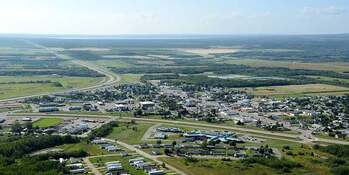 I have served in a few small rural churches. I have had conversations with many rural pastors. Some have healthy, thriving churches. Others are in communities that are very small, and so the church is very small as well. This means that they have a hard time paying a pastor, and if they do, the salary is quite low. I have been wondering for a while if some of these rural churches would benefit from joining up with some neighboring churches to form one church with multiple sites in multiple small communities. I am serving a small church right now. There is a small church in a very small community about thirty minutes away that has no pastor presently. Another 30 minutes or so down the road is another small community with a church that has been dwindling, and also does not have a pastor right now with no idea how they can afford their next one. What if churches like this joined together? Not into one congregation but as one church serving three small communities. The one church can afford a pastor, though the salary is very low. The other two do not have a pastor. What if the churches formed one church that could then hire 2 pastors to serve all three churches. They could share finances and share resources. Here are some benefits I see. 1. You could have a lead pastor to do most of the preaching, set the direction, and work with the leadership of each site. 2. A system would be worked out to have the lead pastor at each site in person at least twice a month on a Sunday. Service times could be adjusted to allow for the pastor to preach in person at two of the sites each Sunday. Video format could be used for the off Sundays. Or, a layperson, or a second pastor could preach on those off Sundays. 3.Each site would have their own elected leadership. They would each meet separately to discuss local issues one month and then a few from each leadership board would meet the alternating month to discuss the big picture. Finances would all flow into one bucket. Each site would build their budget and these three would then be part of making up the larger budget. 4. If you had enough finances to afford a second pastor, you could now determine how best to staff. Maybe you would hire someone to be in charge of Children and Youth Ministry at each site. You could, at least occasionally, meet with all the youth from each site for events. Or maybe you could hire some part-time people to be site pastors but who would also serve the larger church in an area they were gifted in (serving as a Worship Pastor, or Small Groups Pastor, etc.). 5. This would allow for an ongoing presence in each of these small towns, still serve the church and equip and encourage them in reaching their community, and the shared resources would provide the pastoral care they needed. I am really curious if anyone has an example of this working somewhere. If you do, please email me and let me know how it works. Thanks, Andy
2 Comments
 "I've told you a thousand times" is usually an exaggeration, but maybe it shouldn't be for church leaders who are leading the Sunday morning Worship Service. Most new people in church start by attending the Sunday morning service. They have decided that they want to go to church. They may have heard from a friend or neighbor that this church is good. They may have checked out your website and Facebook page. They may have carefully planned out their first visit. And now they sit in the fourth row from the back, listening and looking around to try to figure out what is expected of them. I once attended a Portuguese Catholic funeral service of the father of a member of our church. I am not Catholic and do not know the traditions, much less the traditions of their funerals. I am not Portuguese and am not able to understand anything said in that language. My wife and I were constantly looking around trying to decipher what was expected of us: when to stand, when to sit, what to do. When new people come to church, especially if they are in a church for the first time in their life, they are trying to understand the "language" of the church. They too are trying to figure out what is expected of them. Do we join in with the "karaoke" singing, as people sing along with words on the screen, or do I just allow the band to entertain me? What do I do when they pass the baskets up and down the rows? In one church, they passed a binder with pages of information for each person to fill out as the singing was happening. No explanation was given, but everyone faithfully filled in information and then passed the binder to the person next to them. The poor first timer is flooded with questions. What is this for? Why are they asking for all this personal mailing information? What will they do with it? Do I have to fill it out? We need to explain things as they happen in our services. Tell people why you are doing things and how you are inviting them to be involved. This is not just for the newcomers, but also for the people who regularly attend. Why do people automatically stand to sing? Do they have to, or is this an option? What is expected of them when the offering bag or basket is passed around? Are they supposed to answer the questions the preacher asks in his sermons? Or are they rhetorical questions with no answer expected? One church had different colors of cloth (like a small towel) draped over the ends of the pews. Sections of the church had the same colors. Toward the end of the service they explained that they were encouraging people to get to know the people in their "section". They explained that some Sundays they had special coffee times for certain sections at their little "cafe" in their entry area. Each Sunday they would explain what they were hoping the people in the congregation would do. And the people began to do what was asked of them. It was explained and explained again. People understood, and then actually began doing what was asked. It worked because they explained it and explained it and explained it Sunday after Sunday. Do not assume everyone will know what you want them to do, whether it is in the Sunday service, or in any other aspect of the church. Good leadership will explain clearly what is asked of people again and again.  Rural pastors, by choice or by what opportunities were available, you are serving in small out of the way places. Rural pastor, you are not serving in big cities and big churches and the fame that seems to come to some who are serving in these places. Yet you are following in Jesus' footsteps. Look at Mark 1: 35-39. Before daybreak the next morning, Jesus got up and went out to an isolated place to pray. Later Simon and the others went out to find him. When they found him, they said, “Everyone is looking for you.” But Jesus replied, “We must go on to other towns as well, and I will preach to them, too. That is why I came.” So he traveled throughout the region of Galilee, preaching in the synagogues and casting out demons. Jesus had been busy healing people and casting out demons. The crowds were amazed. They were excited. They wanted more of this from this miracle worker. The disciples saw the crowds and thought that Jesus should be out there continuing to satisfy the crowds. Instead, Jesus chose to continue to go on to other towns to preach to these other townfolk. Rural pastor, you ended up in your rural community by choice or by the situations you found yourself in. Maybe you are longing for a bigger audience. Maybe you look longingly at your friends who graduated from Bible College and Seminary with you who are now leading large congregations in the city. Take a cue from Jesus. Preach to your community and reach out to them. Many small rural communities have only one or two churches. The people in these small communities need to hear the gospel just as much as anyone in the city. There is a difference though. When a person in the city wants to hear about Jesus, that person has a choice of tens, or even hundreds, of churches to attend. There hundreds and thousands of believers spread throughout their city. When a person in the isolated rural communities wants to hear about Jesus, in many cases they have the option of one or two churches to go to. They have the possibility of encountering a few believers who might help them find Jesus. Rural churches are important to those who have limited opportunity to encounter someone who will point them to Jesus. Rural pastor, recognize your role as being in the unique place of providing the gospel to people who have few options in their search for Jesus once that search begins. Rural pastor, you are following in the footsteps of Jesus when you serve in the quiet places of our nation. See your role as vital to your congregation and to your community. You are bringing the gospel to people who need Jesus, and doing it in places where anyone searching has limited opportunities to find answers about Jesus! Most rural churches are small because most rural communities are small. That is not a bad thing, that is just the way it is. But in small churches we notice when a few families are missing. Numbers can go down quickly.
This past Sunday I was in a small church and was reminded about how there are regular ups and downs in the attendance of each church. This building seated about 120 or more, but there were only about 25 people in church that Sunday. I felt a little sorry for the pastor because I have had many of those Sundays in my ministry experience as well. Each church has "seasons" where we know certain things will happen. If you are in a farming community, your farmers will have little time for church meetings during seeding and harvest time. If you are in a ranching community, you know that your members who are calving will not be around much during the time their new calves come. If you are in a logging community, you know that there are certain times when the loggers go all out, and other times where they have all kinds of time on their hands. Each church is also affected by the seasons of holidays. If your church is young, many will be gone to visit family during the special Sundays of Thanksgiving or Christmas or Easter. If your church is older, you will probably have an in attendance on those special Sundays as family comes home to spend the weekend with mom and dad. If you live in the north, you may have realized that as soon as good weather comes, everyone goes camping - at least it sure feels that way. Summer holidays means that many of your people will be vacationing away somewhere. This church I attended this past Sunday was a small church to begin with, but this Sunday it competed with summer vacations, a long weekend with a holiday Monday, and a nice sunny day in a long period of clouds and rain. As a result, many people were away. And good for them. But it can be disheartening for the pastor. It is so easy to allow the ups and downs of church attendance to also make our emotions go up and down. We need to understand the seasons of our church. We need to see that when many people are gone, that is okay. For many, they are spending quality family time together that they cannot do when Dad is always at work. It's okay. And when everyone returns in September and numbers go back up, celebrate that. They have come back to church. They are still part of the church even if they miss some Sundays over the summer. Understand the seasons of your church. Plan for meetings and activities during the slow times. Plan for less busy-ness at church during the busy times when your members are not available. Allow your church calendar of programs to go with the ebb and flow of your community. When everyone is busy, take time to plan ahead. Pastor, work ahead on your sermon series. Plan for your next ministry season. Take time to pray and plan so you are ready when your members slow down. Understand the seasons of your church and do not allow a Sunday or two of low attendance to bring you down emotionally.
Some of us hate writing things down. Others of us love it and we have papers and files all over the place. But putting things in print is extremely important! I was having some difficulty getting traction in a church with bringing new people into the church. I tried some special things on Sunday morning but they were met with little enthusiasm. It was only as I received a document the leadership had been working on that I finally realized what was going on. We were on completely different pages when it came to outreach. I thought it was great if people would invite and bring their unbelieving friends to church and we as a church could assist our members in reaching their friends for Jesus. The document from the leadership clearly stated: Sunday morning is for believers. Now I understood the resistance to some of the things that I had been planning and trying to do. They did not agree with me on how to use our Sunday morning time as a church. If we put something in print, we have probably thought it through a bit. Maybe we have had a few rough copies. But the final thing we put in front of people can be clear and concise information about something. This removes guess work and makes sure everyone understands the same thing. What do you put in writing? A church should have a written Statement of Faith, whether it is on paper or online doesn't matter. The point is people should be able to access it. A church would also do well in including their Vision and Mission, what they think God's unique purpose is for their church. One of the things that is hard to do is a Values list. A Values list is helpful because it tells everyone what is important. A church might also want in writing some of the things that are always on the calendar every year. A pastor would benefit from having a written Philosophy of Ministry. Basically, that just means a description of how they think ministry should happen and how and what God has called and prepared them for specifically. A pastor could also be clear about his own vision and mission. What is it that gives you the greatest sense of fulfillment? Put it in writing. There may be other things that you think should be included, but the important thing is to communicate well with those who need to know. Put it in writing and people can check back with it from time to time. It can help keep everyone on the same page. Put it in Writing!! I  One of the difficulties of rural ministry is that so often the youth you have been pouring into leave the church when they get older. Is it possible to celebrate those who are leaving rather than bemoaning the fact that they are deserting you? Youth leave a rural church for a couple of main reasons. Often, probably the biggest reason youth leave, is they are heading off for school. Some head off for a trade school that will enable them to come back and work on a local farm or at one of the local oil companies. Many go off to school and find that their education has prepared them for a career that is not available in their hometown. Others get married and then head off to live near the spouse's parents. When youth leave, we are often sad, even frustrated that we are losing them just as they are developing into great volunteers in the church. Jane is leaving and we could really have used her in children's ministry this next year. Joe is leaving and we could really use him on our worship team. It is frustrating to see them leave and take their skills and willing heart to serve in another church. But what if we saw them as missionaries. Francis Chan has said he wants to disciple people in his church so that any of them could be dropped in any city of the world and they would be able to start a church there. Can we see that goal being realized, at least to some extent, in our young people? What if we worked hard in our little rural church to disciple our children and youth. If they leave, then they are prepared to serve God elsewhere. And...if they stay, then we have prepared them to serve well. It may not always feel like a win for us, but it is always a win for the Kingdom of God!! One author surveyed a large church in Toronto and discovered that more than 50% of the volunteers had begun serving and learned their skills in a small country church. Just think, if those county churches could see the role they played in sending these missionaries into the city, could that be encouraging to them? So do everything you can to pour into your children and youth. Give them many opportunities to serve and learn. Help them discover how God has gifted the and then equip them to use those gifts well. And when they head off to school, or to live in the city, commission them as missionaries serving in the city through the church they end up in! Commission the youth who are leaving and celebrate that God will use them in another place. And trust that God will rest up the next person to fill the empty spots.  If you are committed to reaching people in your community for Jesus you are quite likely attending some community events where you end up sitting with people you do not yet know. Are you just going to put up with them, or are you going to "pursue the for Jesus". I am reading a great book by Rick Lawrence, called Shrewd. He suggests that when Jesus says, "Be shrewd as snakes and innocent as doves", that he means it. So he gives some ideas on how to be shrewd in getting to know people at pursuing them for Jesus, He suggests 3 Habits. #1: Asking One More Question Just maybe one more question opens the door to this person. i tried this at work in the coffee room. One other bus driver ( I am driving school bus right now) made a comment about "where they tried to put the IV in". I could have just ignored it, and often would have, but this time I decided to ask one question. I asked if she had been in the hospital. Soon she was giving me the rundown on her terrible long weekend that meant going back to the hospital every day for some treatments for an infection she got. Ask one more question. #2: Thinking Like Sherlock Holmes Sherlock always sees more than there is. Watson just sees the dirty old hat. Sherlock sees that the wearer must have been wealthy once but not anymore. He is no longer with his wife. And on and on. We need to pay more attention when we see people. Things about them give us many clues about who they are. What's on their hat? What kind of footwear do they wear? And be aware so you can get to know the person and pursue them for Jesus. #3: Pursuing With Persistence How often do we give up on a person after one or two tries? They said no to coming to church once. We don't invite them again. We try to bring up the gospel and get shut down once so we back right off. He suggests we need to keep pursuing and look for new ways to break down the person's resistance so we can tell them the most important think in the world. They can live forever!! See the stranger as someone to pursue. Try these three habits. See what God does! |
|
 RSS Feed
RSS Feed